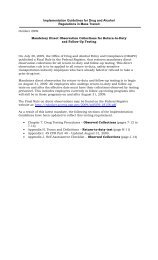What Employers Need To Know About DOT Drug and Alcohol Testing
What Employers Need To Know About DOT Drug and Alcohol Testing
What Employers Need To Know About DOT Drug and Alcohol Testing
You also want an ePaper? Increase the reach of your titles
YUMPU automatically turns print PDFs into web optimized ePapers that Google loves.
Event<br />
Fail to sign the<br />
certification statement at<br />
Step 2 of the ATF<br />
Fail to cooperate with any<br />
part of the alcohol testing<br />
process<br />
Decision Maker<br />
Employer / DER *<br />
[after review of the STT or<br />
BAT documentation]<br />
Employer / DER *<br />
[after review of the STT or<br />
BAT documentation]<br />
<strong>What</strong> <strong>Employers</strong> <strong>Need</strong> to <strong>Know</strong> <strong>About</strong> <strong>DOT</strong> <strong>Drug</strong> <strong>and</strong> <strong>Alcohol</strong> <strong>Testing</strong> – October 1, 2010<br />
29<br />
<strong>DOT</strong> Instructions<br />
If the employee does not agree to have a<br />
test accomplished by signing Step 2 of the<br />
ATF, it is a refusal.<br />
One example of failing to cooperate is<br />
when the employee behaves in a<br />
confrontational manner that disrupts the<br />
alcohol testing process.<br />
*IMPORTANT NOTE: When a collector for a drug test, or an STT or BAT for an alcohol test, reports a<br />
refusal event to the DER, the EMPLOYEE MUST IMMEDIATELY BE REMOVED FROM SAFETY-<br />
SENSITIVE DUTIES, <strong>and</strong> after that you [or the DER] must verify if the employee actually refused the test<br />
based upon the documentation provided <strong>and</strong> <strong>DOT</strong>’s instructions. When you [or the DER] determine that there<br />
is a refusal, do not return the employee to safety-sensitive duties until the SAP return-to-duty process is<br />
successfully completed.<br />
In extremely rare cases for which you [or the DER] determine there is not a refusal, you [or the DER] must<br />
document your decision <strong>and</strong> your solid reasoning for it. You must maintain this documentation for a <strong>DOT</strong><br />
Agency or USCG representative in the event of an inquiry or inspection.<br />
Remember, your decision could be overturned by the <strong>DOT</strong>, a <strong>DOT</strong> Agency, or the USCG. So, as a safeguard<br />
to ensure that you make the correct determination, you ought to consult with your MRO on collection site<br />
refusals – the MRO is, after all, the ―Gatekeeper‖ for the drug testing process.<br />
NOTE: An MRO’s refusal determination is final <strong>and</strong> not subject to your review.<br />
Also, an evaluating physician’s refusal determination for an employee’s insufficient<br />
breath is final <strong>and</strong> not subject to your review.
















